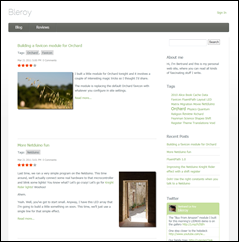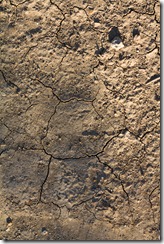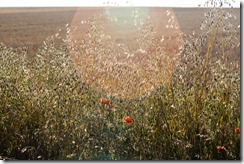Tales from the Evil Empire
Bertrand Le Roy's blog
-
Migrating an Orchard site from SqlCe to Sql Express using WebMatrix
In this short video, I show how to use WebMatrix to migrate an Orchard site from using the file-based SqlCe to a SQL Express database.
-
What happens when I request a page in Orchard?
 If you look at a typical request for a page, the route will resolve the URL to the Display method of the ItemController in Orchard.Core/Routable/Controllers. That action will retrieve the content item for that route from the content manager and ask it to build the display. The ShapeResult it will produce is what is returned by the action.
If you look at a typical request for a page, the route will resolve the URL to the Display method of the ItemController in Orchard.Core/Routable/Controllers. That action will retrieve the content item for that route from the content manager and ask it to build the display. The ShapeResult it will produce is what is returned by the action. -
Taking over list rendering in Orchard
 A task that is likely to pop-up oftentimes when customizing an Orchard theme for a project is list rendering. Two types of shapes will typically be at work when rendering a list in Orchard: the summary shape and the list shape.
A task that is likely to pop-up oftentimes when customizing an Orchard theme for a project is list rendering. Two types of shapes will typically be at work when rendering a list in Orchard: the summary shape and the list shape. -
Dispatching Orchard shapes to arbitrary zones
 In my LIDNUG demo last week, I showed an interesting technique that I know some people will want to apply to their own stuff.
In my LIDNUG demo last week, I showed an interesting technique that I know some people will want to apply to their own stuff. -
Driving a LED matrix from a Netduino one more time: The Right Way
 In previous posts, we've seen two ways one can drive a small LED matrix from a Netduino.
In previous posts, we've seen two ways one can drive a small LED matrix from a Netduino. -
My Orchard talk for LIDNUG
 I just finished speaking at LIDNUG. You can download the recording here:
I just finished speaking at LIDNUG. You can download the recording here: -
Dynamically switching the theme in Orchard
 It may sound a little puzzling at first, but in Orchard CMS, more than one theme can be active at any given time. The reason for that is that we have an extensibility point that allows a module (or a theme) to participate in the choice of the theme to use, for each request. The motivation for building the theme engine this way was to enable developers to switch themes based on arbitrary criteria, such as user preferences or the user agent (if you want to serve a mobile theme for phones for example). The choice is made between the active themes, which is why there is a difference between the default theme and the active themes.
It may sound a little puzzling at first, but in Orchard CMS, more than one theme can be active at any given time. The reason for that is that we have an extensibility point that allows a module (or a theme) to participate in the choice of the theme to use, for each request. The motivation for building the theme engine this way was to enable developers to switch themes based on arbitrary criteria, such as user preferences or the user agent (if you want to serve a mobile theme for phones for example). The choice is made between the active themes, which is why there is a difference between the default theme and the active themes. -
The best way to learn how to extend Orchard
 We do have tutorials on the Orchard site, but we can't cover all topics, and recently I've found myself more and more responding to forum questions by pointing people to an existing module that was solving a similar problem to the one the question was about.
We do have tutorials on the Orchard site, but we can't cover all topics, and recently I've found myself more and more responding to forum questions by pointing people to an existing module that was solving a similar problem to the one the question was about. -
Storing non-content data in Orchard
 A CMS like Orchard is, by definition, designed to store content. What differentiates content from other kinds of data is rather subtle. The way I would describe it is by saying that if you would put each instance of a kind of data on its own web page, if it would make sense to add comments to it, or tags, or ratings, then it is content and you can store it in Orchard using all the convenient composition options that it offers. Otherwise, it probably isn't and you can store it using somewhat simpler means that I will now describe.
A CMS like Orchard is, by definition, designed to store content. What differentiates content from other kinds of data is rather subtle. The way I would describe it is by saying that if you would put each instance of a kind of data on its own web page, if it would make sense to add comments to it, or tags, or ratings, then it is content and you can store it in Orchard using all the convenient composition options that it offers. Otherwise, it probably isn't and you can store it using somewhat simpler means that I will now describe. -
Caching items in Orchard
 Orchard has its own caching API that while built on top of ASP.NET's caching feature adds a couple of interesting twists.
Orchard has its own caching API that while built on top of ASP.NET's caching feature adds a couple of interesting twists.
